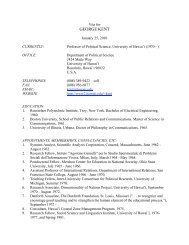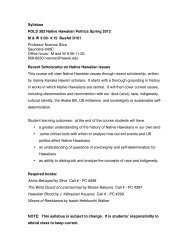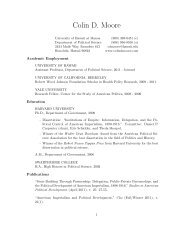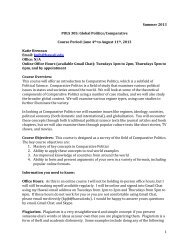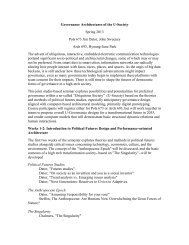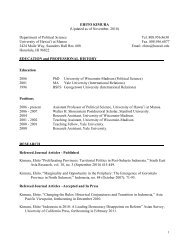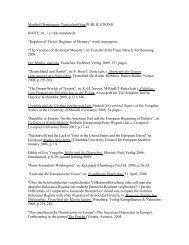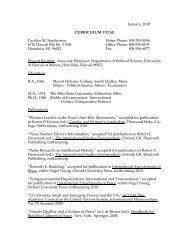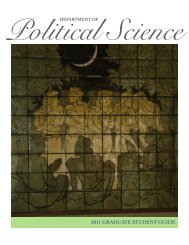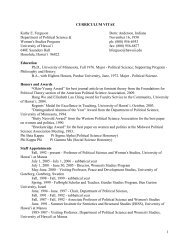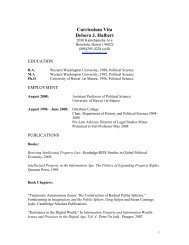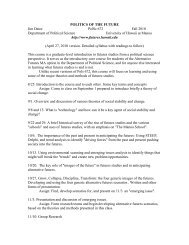Fall 2012 POLS 620 Syllabus [PDF] - Department of Political Science
Fall 2012 POLS 620 Syllabus [PDF] - Department of Political Science
Fall 2012 POLS 620 Syllabus [PDF] - Department of Political Science
You also want an ePaper? Increase the reach of your titles
YUMPU automatically turns print PDFs into web optimized ePapers that Google loves.
Pr<strong>of</strong>essor: Dr. Noelani Goodyear-Kaʻōpua Office: Saunders 609<br />
E-mail: goodyear@hawaii.edu<br />
Office Hours: Thurs 12:30 – 2:30pm<br />
<strong>POLS</strong> <strong>620</strong>: Introduction to Indigenous Politics<br />
<strong>Fall</strong> <strong>2012</strong> - Wednesday 12:30 - 3:00pm<br />
Course Description:<br />
This course provides an introduction to the genealogical, activist and academic concerns <strong>of</strong> the<br />
field <strong>of</strong> Indigenous Politics, particularly as it is taught within this particular location--UH Mānoa.<br />
It is also an International Cultural Studies Certificate (ICSC) Program Graduate elective course.<br />
You should leave the course with an understanding <strong>of</strong> some <strong>of</strong> the main trajectories that Native<br />
& Indigenous Studies have followed over the last four decades, as well as the key concepts that<br />
inform the field today. These include: indigenous/indigeneity, colonialism, settler colonialism,<br />
heteropatriarchy, survivance, sustainable self-determination, aloha ʻāina, wasase,<br />
recognition/reconciliation, resurgence, and anarcha-indigenism, to name a few. Prepare to read a<br />
lot, expand your mind and have fun! Indigenous people have faced dispossession and genocidal<br />
forces, so this class should not be a death march too! It includes as much celebration <strong>of</strong><br />
Indigenous survivance (ooh, there’s one <strong>of</strong> those key terms already), as it does critique <strong>of</strong> the<br />
forces that have sought to subordinate autochthonous nations.<br />
We will approach Indigenous Politics from a comparative and interdisciplinary lens, since the<br />
political and intellectual projects that drive Indigenous Studies have never been contained in or<br />
by a single academic discipline. The course is interdisciplinary, just as indigenous peoples’<br />
movements to maintain and revitalize cultural practices, assert political, economic, and social<br />
control over their lives and livelihoods require fluency across fields <strong>of</strong> knowledge. Furthermore,<br />
if we understand indigeneity to be a political category that recognizes both the connection <strong>of</strong><br />
autochthonous peoples to our lands and the international alliances and interconnections amongst<br />
peoples who identify as Indigenous, then our focus is necessarily comparative. However,<br />
Hawai‘i is our base, and the course materials privilege texts in Indigenous Studies that focus on<br />
Hawai‘i, Oceania, and North America.<br />
Course Objectives:<br />
• Begin to map out the interdisciplinary field <strong>of</strong> Indigenous Politics/Indigenous Studies,<br />
particularly as it relates to your own research interests and commitments.<br />
• Better understand the diversity <strong>of</strong> Indigenous peoples and struggles, and think about<br />
indigeneity as an identity <strong>of</strong> alliance, i.e., by calling ourselves ‘Indigenous,’ we connect<br />
to others beyond our local struggles.<br />
• Critically engage Indigenous forms <strong>of</strong> theory and methods.<br />
• Think about and articulate your own position in relation to the land on which you reside<br />
and the Indigenous peoples <strong>of</strong> it.<br />
• Consider forms <strong>of</strong> Indigenous governance and how they have been transformed over<br />
time, as well as visions for post-imperial or anti-colonial futures.<br />
• Analyze intersecting axes <strong>of</strong> oppression, particularly indigeneity, race, gender, sexuality,<br />
and class.<br />
• Consider ways to practice academic, artistic and activist aspects <strong>of</strong> Indigenous Politics.<br />
• Prepare a portfolio that demonstrates your progress on these as well as your own goals<br />
and objectives.<br />
1
Pr<strong>of</strong>essor: Dr. Noelani Goodyear-Kaʻōpua Office: Saunders 609<br />
E-mail: goodyear@hawaii.edu<br />
Office Hours: Thurs 12:30 – 2:30pm<br />
Required Texts: All books (except Forced Federalism) are available for purchase from the UH<br />
bookstore. There will be additional readings accessible through Laulima.<br />
Aikau, Hokulani. <strong>2012</strong>. A Chosen People, A Promised Land: Mormonism and Race in Hawaiʻi.<br />
Minneapolis: University <strong>of</strong> Minnesota Press.<br />
Alfred, Taiaiake. 2005. Wasáse: Indigenous Pathways <strong>of</strong> Action and Freedom. Toronto: Broadview Press.<br />
Allen, Chadwick. 2002. Blood Narrative: Indigenous Identity in American Indian and Maori Literary and<br />
Activist Texts. Durham: Duke University Press.<br />
Césaire, Aimé. 2001. Discourse on Colonialism. Monthly Review Press.<br />
Corntassel, Jeff, and Richard C. II Witmer. Forced Federalism: Contemporary Challenges to Indigenous<br />
Nationhood. Norman: University <strong>of</strong> Oklahoma Press, 2008.<br />
Deloria, Vine Jr. 1988. Custer Died for Your Sins: An Indian Manifesto. Norman: University <strong>of</strong><br />
Oklahoma Press.<br />
Diaz, Vicente M. 2010. Repositioning the Missionary: Rewriting the Histories <strong>of</strong> Colonialism, Native<br />
Catholicism, and Indigeneity in Guam. Honolulu: University <strong>of</strong> Hawaiʻi Press and the Center for<br />
Pacific Islands Studies.<br />
Dillon, Grace L, ed. <strong>2012</strong>. Walking the Clouds: An Anthology <strong>of</strong> Indigenous <strong>Science</strong> Fiction. 1st ed.<br />
Tucson: University <strong>of</strong> Arizona Press.<br />
Driskill, Qwo-Li et al., eds. 2011. Queer Indigenous Studies: Critical Interventions in Theory, Politics,<br />
and Literature. University <strong>of</strong> Arizona Press.<br />
Howe, LeAnne. 2001. Shell Shaker. 1st ed. San Francisco: Aunt Lute Books.<br />
Memmi, Albert. 2005. The Colonizer and the Colonized. Beacon Press.<br />
Trask, Haunani-Kay. 1999. From a Native Daughter: Colonialism and Sovereignty in Hawaiʻi. Revised<br />
ed. Honolulu: University <strong>of</strong> Hawaiʻi Press.<br />
Course Requirements and Assessments:<br />
I believe the form <strong>of</strong> grading, based on capitalist logics, pervasive in most schools and universities is<br />
counter-productive to encouraging student-driven learning. Because we work within that system, you will<br />
receive a letter grade based on your performance in this course. However, you and I will determine that<br />
grade together.<br />
At the beginning <strong>of</strong> the course, you will create goals along the dimensions: 1) affective, 2) social, 3)<br />
analytical. Your goals will obviously overlap the various dimensions, and you should feel free to add<br />
other dimensions or general goals that don’t fit well in one category or another. Your learning goals<br />
should be clear, understandable, attainable, and demonstrable (i.e. you can show evidence <strong>of</strong> your<br />
progress). At the end <strong>of</strong> the course, you will submit a narrative assessment and recommended letter grade<br />
with your final portfolio, which will serve as the evidence for your recommended grade.<br />
As the pr<strong>of</strong>essor, I have the kuleana <strong>of</strong> final determination <strong>of</strong> your grade. In addition to your selfassessment,<br />
I will look at whether or not you have met the expectations <strong>of</strong> the course outlined in the<br />
syllabus. If the final grade I determine differs from your recommended grade, I will make my reasoning<br />
and evidence available to you, upon request. Beyond just the letter grade, I provide written and verbal<br />
feedback to support you in advancing your projects.<br />
Sample Goals:<br />
Affective dimension<br />
• “I will find ways to work through the discomforts involved in being an ʻŌiwi or a settler in<br />
Hawaiʻi.”<br />
• “I will deepen my respect for the multiple perspectives articulated by Pacific Islanders with<br />
regard to land and sovereignty.”<br />
Social dimension<br />
• “I will participate in collective organizing around creating sustainable, local economies.”<br />
2
Pr<strong>of</strong>essor: Dr. Noelani Goodyear-Kaʻōpua Office: Saunders 609<br />
E-mail: goodyear@hawaii.edu<br />
Office Hours: Thurs 12:30 – 2:30pm<br />
• “I will clarify my kuleana as a scholar working in partnership with a school-based community,<br />
including teachers, family members, and students.”<br />
Analytical dimension<br />
• “I will compare visions about future regional cooperation and identity in the Pacific written by<br />
islanders versus visions written by outsiders.”<br />
• “I will write a publishable-quality critical review <strong>of</strong> the rhetoric and strategies <strong>of</strong> the Grassroots<br />
Institute <strong>of</strong> Hawaiʻi or the Reinstated Hawaiian Kingdom Government.”<br />
Assignments and Expectations<br />
Participation and Attendance<br />
Being absent once or twice is understandable. Once you hit your third absence, your final grade will be<br />
lowered for each subsequent absence. If you miss five or more class sessions, you will not pass the<br />
course.<br />
Final Portfolio<br />
All assignments will be compiled in a final portfolio, including the elements described below. Each<br />
assignment also has it’s own due date, so that you are completing various pieces <strong>of</strong> the portfolio over the<br />
course <strong>of</strong> the semester.<br />
1. Individual reading summaries on texts labeled as including “individual readings”<br />
Due dates: see schedule<br />
For certain class sessions, you will be selecting readings <strong>of</strong> your choice to report back on to the group.<br />
Prepare a summary <strong>of</strong> the main points and issues for discussion, approximately one single-spaced page in<br />
length. Post your contribution to the course blog by 6pm the night before class. These pieces should also<br />
be helpful to you in the long run. That is, they should remind you <strong>of</strong> the main arguments, aims, and<br />
methods <strong>of</strong> the work, your analysis <strong>of</strong> its success, and your reflections on how it speaks to other readings,<br />
events, or your own research projects. Be prepared to speak to your colleagues in class on what you find<br />
useful, problematic, intriguing about what you’ve read.<br />
2. Book review<br />
Due: The week after the book you are writing about has been assigned on the syllabus. (This<br />
gives you the opportunity to use discussion in class to help you think about the review.)<br />
A book review is a very particular kind <strong>of</strong> academic writing that summarizes and provides a critical<br />
analysis <strong>of</strong> a text. The purpose <strong>of</strong> a book review is to provide someone interested in the book with enough<br />
information to determine whether or not it is applicable to their research and/or teaching needs. It is<br />
prepared for a targeted audience and situates the book within an existing field. Book reviews are a great<br />
way to begin to establish a publishing record as a graduate student. Here is the process I’d like you to<br />
follow:<br />
• Choose one book from our list <strong>of</strong> assigned readings. I have marked eligible books with an<br />
asterisk in the course schedule.<br />
• Identify an academic journal that would likely find this book applicable to their readers.<br />
• Research their guidelines for book reviews and use these guidelines to structure your review.<br />
Please attach the book review guidelines you used to organize and structure your paper.<br />
• You may helpful guides on writing book reviews at the following hyperlinks: Purdue OWL,<br />
ANU academic skills, H-net review guidelines<br />
After you submit our review to me, I will provide you feedback so that you may revise your review, if<br />
you wish, for actual submission to a journal or for your final portfolio.<br />
3. Letter to someone outside the academy: written, spoken or video<br />
Due date: November 21<br />
One <strong>of</strong> the central ethical commitments in Indigenous Studies is to take our knowledge outside the<br />
academy. Similarly, a friend <strong>of</strong> mine lovingly shared this piece advice with a group <strong>of</strong> Indigenous Studies<br />
students when we were visiting his home community: “Don’t stay in your closet playing with yourself<br />
and your knowledge!” Sharing useful knowledge is essential, and this <strong>of</strong>ten requires translation from the<br />
dominant languages <strong>of</strong> the academy to languages that are more accessible within our other communities.<br />
3
Pr<strong>of</strong>essor: Dr. Noelani Goodyear-Kaʻōpua Office: Saunders 609<br />
E-mail: goodyear@hawaii.edu<br />
Office Hours: Thurs 12:30 – 2:30pm<br />
In this assignment, I want you to write or speak a letter (or some other form such as a mele, poem,<br />
personal narrative) to a specific person who is not located within academe. Take some <strong>of</strong> the central<br />
insights you are learning and share them with this person. Start a dialogue. Make some observations.<br />
Engage this person in your process, and push yourself to integrate emotion and analysis. Whether or not<br />
you actually share this piece with your intended audience is up to you. If you are looking for inspiration,<br />
check out James Baldwin’s “My dungeon shook: Letter to my nephew on the 100 th anniversary <strong>of</strong> the<br />
emancipation.”<br />
4. A mapping <strong>of</strong> major ideas, arguments, texts and authors. AND oral defense.<br />
Due date: Dec 14<br />
The final assignment is intended to help you synthesize what you have learned in this introduction to<br />
Indigenous Politics. We have talked about the formation <strong>of</strong> Indigenous Studies in terms <strong>of</strong> various<br />
genealogies, so think about this assignment as an opportunity to map the relationships between texts,<br />
ideas, social movements, authors and/or places. Your map can take the form <strong>of</strong> a diagram with text, a<br />
conventional annotated bibliography or literature review, a collection <strong>of</strong> images related to the works we<br />
read (with captions), a series <strong>of</strong> blog postings in a public forum, or a mele with an explanatory essay.<br />
Whatever form you decide to use, you should include at least 10 <strong>of</strong> the texts we have engaged this<br />
semester which have been most influential to you. Most importantly, the process and product should be<br />
useful to you (and others) in the long run. You will present and defend your map during the final meeting<br />
<strong>of</strong> our class.<br />
5. A final self-assessment <strong>of</strong> your performance and achievements in the course<br />
Due date: Dec 14<br />
The self-assessment must include the letter grade you recommend for your performance in the course. It<br />
should then substantiate that recommendation by describing what you’ve put forth and what you’ve<br />
gained from the class. You will have a separate opportunity to evaluate the course and me, so keep this<br />
focused on you and your performance. The self-assessment should be the cover page <strong>of</strong> your portfolio<br />
and should be followed by all the pieces listed above (#1-4).<br />
Policies<br />
Late Work: Late work is unacceptable. If extraordinary circumstances arise, I will consider exceptions<br />
on a case-by-case basis. There will be a grade penalty <strong>of</strong> some kind, if the work is accepted at all.<br />
Academic Integrity: It is the studentʻs responsibility to be aware <strong>of</strong> and in compliance with the<br />
university’s policies regarding academic dishonesty. (See the UH catalog, link:<br />
http://www.catalog.hawaii.edu/about-uh/campus-policies1.htm). Furthermore, cheating and stealing are<br />
not acceptable within a Hawaiian cultural value system. Any academic dishonesty—such as plagiarism—<br />
will result in failure <strong>of</strong> the course. Plagiarism is taking another person’s words or ideas without<br />
crediting them. Anything cut and pasted from a website without quotation marks and proper citation is<br />
plagiarism. Copying anything from a book or journal without quotation marks and proper citation is<br />
plagiarism. Plagiarism is academic theft, and there is no excuse for it. A student who submits a paper<br />
with plagiarized parts will receive an ʻFʻ for the course, no discussion.<br />
Plagiarism usually occurs when students feel overwhelmed—by school, by finances, by illness,<br />
relationship problems, etc. If you are dealing with a situation like this, please let me know and we can<br />
work something out that will be much more positive than cheating. If you are unsure about how to<br />
properly use and credit sources, ask me for advice. You can also consult any <strong>of</strong> the numerous online<br />
sources that provide tips on academic writing. See me if you need suggestions.<br />
Reasonable Accommodation Policy: If you feel you need reasonable accommodations because <strong>of</strong> the<br />
impact <strong>of</strong> a disability, please 1) contact the KOKUA Program (V/T) at 956-7511 or 956-7612 in room<br />
013 <strong>of</strong> QLCSS; 2) speak with me privately to discuss your specific needs. I will be happy to work with<br />
you and the KOKUA Program to meet your access needs.<br />
4
Pr<strong>of</strong>essor: Dr. Noelani Goodyear-Kaʻōpua Office: Saunders 609<br />
E-mail: goodyear@hawaii.edu<br />
Office Hours: Thurs 12:30 – 2:30pm<br />
Course Schedule<br />
Foundations: Historical, Conceptual and Activist<br />
Aug 22<br />
Ho’olauna<br />
Early Influences<br />
Cesaire, Discourse on Colonialism<br />
Memmi, The Colonizer and the Colonized<br />
Waziyatawin’s poem, “Speak to me <strong>of</strong> justice when…”<br />
Supplemental: Fanon, Wretched <strong>of</strong> the Earth and Black<br />
Skin, White Masks<br />
Aug 29<br />
Academics and Activism<br />
in Native North America<br />
Deloria, Custer Died For your Sins<br />
Akwesasne Notes, A Basic Call to Consciousness<br />
Sept 5<br />
Sept 12<br />
Academics and Activism<br />
in Hawaiʻi<br />
Sovereignty and<br />
Recognition<br />
Trask, From a Native Daughter<br />
Individual readings: Pick one <strong>of</strong> the chapters from Trask’s<br />
book to read more closely.<br />
Barker, Introduction to Sovereignty Matters<br />
Simpson, “Under the Sign <strong>of</strong> Sovereignty”<br />
Alfred, Excerpt from Peace, Power, Righteousness<br />
Coulthard, “Subjects <strong>of</strong> Empire: Indigenous Peoples and the<br />
Politics <strong>of</strong> Recognition in Canada”<br />
Sept 19<br />
Sept 26<br />
Settler colonialism and<br />
white supremacy<br />
Queer Indigenous<br />
critiques <strong>of</strong><br />
heteropatriarchy<br />
Fujikane, Intro to Asian Settler Colonialism*<br />
Moreton-Robinson, “Imagining the good indigenous<br />
citizen”<br />
Saranillo, “Colliding Histories: Hawai’i Statehood at the<br />
Intersection <strong>of</strong> Asians ‘Ineligible to Citizenship’ and<br />
Hawaiians ‘Unfit for Self-Government”<br />
Smith, “Three Pillars <strong>of</strong> White Supremacy”<br />
Wolfe, “Settler Colonialism and the Elimination <strong>of</strong> the<br />
Native”<br />
Individual readings: You are expected to read all the<br />
articles for today, but pick two that you would especially<br />
like to focus on and write about.<br />
Shared reading: Introduction, Part I and Conclusion <strong>of</strong><br />
Queer Indigenous Studies, ed. By Driskill et al. *<br />
Individual readings: At least one additional chapter <strong>of</strong> your<br />
choice in Queer Indigenous Studies<br />
5
Pr<strong>of</strong>essor: Dr. Noelani Goodyear-Kaʻōpua Office: Saunders 609<br />
E-mail: goodyear@hawaii.edu<br />
Office Hours: Thurs 12:30 – 2:30pm<br />
Telling Our Own Stories<br />
Shared reading:<br />
Smith, Excerpts from Decolonizing Methodologies<br />
Vizenor, Excerpt from Survivance<br />
Kanahele, “I am this Land”<br />
Oct 3<br />
Oct 10<br />
Methods<br />
and the role <strong>of</strong> research<br />
Native Agency, Culture<br />
and Religion<br />
Individual readings (at least one <strong>of</strong> the following):<br />
Alfred “Warrior Scholarship”<br />
Andersen, “Critical Indigenous Studies: From Difference To<br />
Density”<br />
Gaudry, “Insurgent research”<br />
Kikiloi, “Rebirth <strong>of</strong> an Archipelago: Sustaining a Hawaiian<br />
Cultural Identity for People and Homeland,”<br />
Teaiwa, “Lo(o)sing the Edge”<br />
Warrior, “Native American Scholarship and the<br />
Transnational Turn”<br />
Diaz, Repositioning the Missionary*<br />
Oct 17<br />
Negotiating Faith and<br />
Culture<br />
Aikau, A Chosen People, A Promised Land*<br />
Oct 24<br />
Activist Texts<br />
Blood Narrative: Indigenous Identity in American Indian<br />
and Maori Literary and Activist Texts<br />
Oct 31<br />
Novels and Genealogy<br />
Howe, Shell Shaker<br />
Nov 7<br />
Native <strong>Science</strong> Fiction<br />
Dillon, Walking the Clouds: An Anthology <strong>of</strong> Indigenous<br />
<strong>Science</strong> Fiction*<br />
Individual readings: You are expected to read the whole<br />
volume, but chose two to read closely and write about.<br />
Nov 14<br />
Settler colonialism,<br />
anthropology and Native<br />
America<br />
*Noe will be at ASA<br />
conference.<br />
Film: Avatar<br />
Essays by Orin Starn, Audra Simpson, and James Clifford in<br />
Cultural Anthropology 26(2)<br />
6
Pr<strong>of</strong>essor: Dr. Noelani Goodyear-Kaʻōpua Office: Saunders 609<br />
E-mail: goodyear@hawaii.edu<br />
Office Hours: Thurs 12:30 – 2:30pm<br />
Contemporary Conditions and Future Visions<br />
Nov 21<br />
Nov 28<br />
Dec 5<br />
Negotiating with Settler<br />
States<br />
Climate Change and<br />
Peak Oil: Impacts on<br />
Indigenous Nations<br />
Fighting for and<br />
nurturing post-imperial<br />
Indigenous Futures<br />
Corntassel and Witmer, Forced Federalism: Contemporary<br />
Challenges to Indigenous Nationhood*<br />
Shared reading:<br />
Grossman and Parker, Asserting Native Resilience: Pacific<br />
Rim Indigenous Nations Face the Climate Crisis*<br />
Individual readings (at least two <strong>of</strong> the following):<br />
Cheyfitz, “Balancing the Earth: Native American<br />
Philosophies and the Environmental Crisis”<br />
Goodyear-Kaʻōpua & Baker, “The Great Shift”<br />
LaDuke, Recovering the Sacred (excerpts)<br />
Waz’iyatawin, “The Coming Collapse”<br />
Shared reading:<br />
Alfred, Wasase<br />
Individual readings:<br />
Alfred, Wasase<br />
Goodyear-Kaʻōpua, Kuleana Lāhui:<br />
Corntassel, “Sustainable Self-Determination”<br />
Dec 12<br />
FINALS WEEK:<br />
Portfolios Due<br />
Final exam scheduled for Friday, Dec 14 from 12 – 2pm. If<br />
the class collectively agrees on an alternate time, we can<br />
meet earlier in the week, but the portfolios will not be<br />
required earlier than the scheduled final exam period.<br />
BIBLIOGRAPHY<br />
Aikau, Hokulani. <strong>2012</strong>. A Chosen People, A Promised Land: Mormonism and Race in Hawaiʻi.<br />
Minneapolis: University <strong>of</strong> Minnesota Press.<br />
Akwesasne Notes, ed. 1986. Basic Call to Consciousness. Revised. Summeaown: Book<br />
Publishing Company.<br />
Alfred, Taiaiake. 1999. Peace, Power, Righteousness: An Indigenous Manifesto. Ontario: Oxford<br />
University Press.<br />
———. 2004. “Warrior Scholarship: Seeing the University as a Ground <strong>of</strong> Contention.” In<br />
Indigenizing the Academy: Transforming Scholarship and Empowering Communities,<br />
Lincoln: Bison Books, p. 88–99.<br />
———. 2005. Wasáse: Indigenous Pathways <strong>of</strong> Action and Freedom. Toronto: Broadview Press.<br />
Allen, Chadwick. 2002. Blood Narrative: Indigenous Identity in American Indian and Maori<br />
Literary and Activist Texts. Durham: Duke University Press.<br />
Andersen, Chris. 2011. “Critical Indigenous Studies: From Difference to Density.” Cultural<br />
Studies Review 15(2): 80–100.<br />
7
Pr<strong>of</strong>essor: Dr. Noelani Goodyear-Kaʻōpua Office: Saunders 609<br />
E-mail: goodyear@hawaii.edu<br />
Office Hours: Thurs 12:30 – 2:30pm<br />
Barker, Joanne, ed. 2005. Sovereignty Matters: Locations <strong>of</strong> Contestation and Possibility in<br />
Indigenous Struggles for Self-Determination. University <strong>of</strong> Nebraska Press.<br />
Césaire, Aimé. 2001. Discourse on Colonialism. Monthly Review Press.<br />
Cheyfitz, Eric. 2009. “Balancing the Earth: Native American Philosophies and the<br />
Environmental Crisis.” Arizona Quarterly: A Journal <strong>of</strong> American Literature, Culture,<br />
and Theory 65(3): 139–162.<br />
Clifford, James. 2011. “Response to Orin Starn: ‘Here Come the Anthros (Again): The Strange<br />
Marriage <strong>of</strong> Anthropology and Native America’.” Cultural Anthropology 26(2): 218–<br />
224.<br />
Corntassel, Jeff. 2008. “Toward Sustainable Self-Determination: Rethinking the Contemporary<br />
Indigenous-Rights Discourse.” Alternatives: Global, Local, <strong>Political</strong> 33: 105–132.<br />
Corntassel, Jeff, and Richard C. II Witmer. Forced Federalism: Contemporary Challenges to<br />
Indigenous Nationhood. Norman: University <strong>of</strong> Oklahoma Press, 2008.<br />
Coulthard, Glen S. 2007. “Subjects <strong>of</strong> Empire: Indigenous Peoples and the ‘Politics <strong>of</strong><br />
Recognition’ in Canada.” Contemporary <strong>Political</strong> Theory 6(4): 437–460.<br />
Dean Itsuji Saranillio. 2010. “Colliding Histories: Hawai‘i Statehood at the Intersection <strong>of</strong><br />
Asians Ineligible to Citizenship’ and Hawaiians ‘Unfit for Self-Government’.” Journal <strong>of</strong><br />
Asian American Studies 13(3): 283–309.<br />
Deloria, Vine Jr. 1988. Custer Died for Your Sins: An Indian Manifesto. Norman: University <strong>of</strong><br />
Oklahoma Press.<br />
Diaz, Vicente M, and J Kehaulani Kauanui. 2001. “Native Pacific Cultural Studies on the Edge.”<br />
The Contemporary Pacific 13(2): 315–342.<br />
Diaz, Vicente M. 2010. Repositioning the Missionary: Rewriting the Histories <strong>of</strong> Colonialism,<br />
Native Catholicism, and Indigeneity in Guam. Honolulu: University <strong>of</strong> Hawaiʻi Press and<br />
the Center for Pacific Islands Studies.<br />
Dillon, Grace L, ed. <strong>2012</strong>. Walking the Clouds: An Anthology <strong>of</strong> Indigenous <strong>Science</strong> Fiction. 1st<br />
ed. Tucson: University <strong>of</strong> Arizona Press.<br />
Driskill, Qwo-Li et al., eds. 2011. Queer Indigenous Studies: Critical Interventions in Theory,<br />
Politics, and Literature. University <strong>of</strong> Arizona Press.<br />
Fujikane, Candace. 2008. “Introduction: Asian Settler Colonialism in the U.S. Colony <strong>of</strong><br />
Hawaiʻi.” In Asian Settler Colonialism: From Local Governance to the Habits <strong>of</strong><br />
Everyday Life in Hawaiʻi, Honolulu: University <strong>of</strong> Hawa’i Press, p. 1–42.<br />
Gaudry, Adam. 2011. “Insurgent Research.” Wicazo Sa Review 26(1): 113–136.<br />
Goodyear-Kaʻōpua, Noelani. 2011. “Kuleana Lāhui: Collective Responsibility for Hawaiian<br />
Nationhood in Activists’ Praxis.” Affinities: A Journal <strong>of</strong> Radical Theory, Culture, and<br />
Action 5(1): 130–163.<br />
Howe, LeAnne. 2001. Shell Shaker. 1st ed. San Francisco: Aunt Lute Books.<br />
Kanahele, Pualani. 2005. “I am This Land, and This Land is Me.” Hūlili: Multidisciplinary<br />
Research on Hawaiian Well-Being 2(1): 21–30.<br />
Kikiloi, Kekuewa. 2010. “Rebirth <strong>of</strong> an Archipelago: Sustaining a Hawaiian Cultural Identity for<br />
People and Homeland.” Hūlili: Multidisciplinary Research on Hawaiian Well-Being 6:<br />
73–115.<br />
Memmi, Albert. 2005. The Colonizer and the Colonized. Beacon Press.<br />
Moreton-Robinson, Aileen. 2011. “Imagining the Good Indigenous Citizen: Race War and the<br />
Pathology <strong>of</strong> Patriarchal White Sovereignty.” Cultural Studies Review 15(2): 61–79.<br />
Silva, Noenoe K. 2004. Aloha Betrayed: Native Hawaiian Resistance to American Colonialism.<br />
Durham: Duke University Press.<br />
Simpson, Audra. 2011. “Settlement’s Secret.” Cultural Anthropology 26(2): 205–217.<br />
8
Pr<strong>of</strong>essor: Dr. Noelani Goodyear-Kaʻōpua Office: Saunders 609<br />
E-mail: goodyear@hawaii.edu<br />
Office Hours: Thurs 12:30 – 2:30pm<br />
———. 2010. “Under the Sign <strong>of</strong> Sovereignty: Certainty, Ambivalence, and Law in Native<br />
North America and Indigenous Australia.” Wicazo Sa Review 25(2): 107–124.<br />
Smith, Andrea. 2006. “Heteropatriarchy and the Three Pillars <strong>of</strong> White Supremacy: Rethinking<br />
Women <strong>of</strong> Color Organizing.” In The color <strong>of</strong> violence: The Incite! Anthology,<br />
Cambridge: South End Press, p. 66–73.<br />
Smith, Linda Tuhiwai. 1999. Decolonizing Methodologies: Research and Indigenous Peoples.<br />
London ; New York: Zed Books.<br />
Starn, Orin. 2011. “Here Come the Anthros (Again): The Strange Marriage <strong>of</strong> Anthropology and<br />
Native America.” Cultural Anthropology 26(2): 179–204.<br />
Teaiwa, Teresia. 2001. “L(o)osing the Edge.” The Contemporary Pacific 12(2): 343–357.<br />
Trask, Haunani-Kay. 1999. From a Native Daughter: Colonialism and Sovereignty in Hawaiʻi.<br />
Revised ed. Honolulu: University <strong>of</strong> Hawaiʻi Press.<br />
Vizenor, Gerald, ed. 2008. Survivance: Narratives <strong>of</strong> Native Presence. Lincoln and London:<br />
University <strong>of</strong> Nebraska Press.<br />
Warrior, Robert. 2011. “Native American Scholarship and the Transnational Turn.” Cultural<br />
Studies Review 15(2): 119–30.<br />
9


![Fall 2012 POLS 620 Syllabus [PDF] - Department of Political Science](https://img.yumpu.com/25416938/1/500x640/fall-2012-pols-620-syllabus-pdf-department-of-political-science.jpg)
